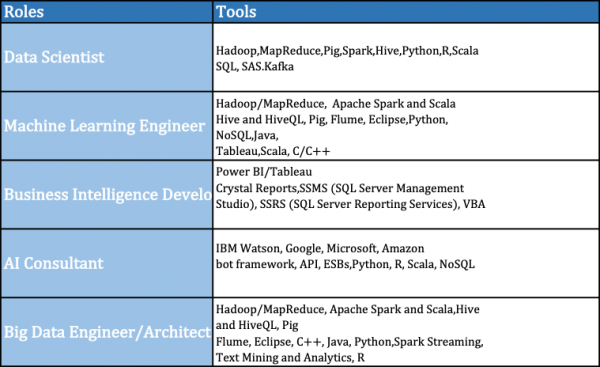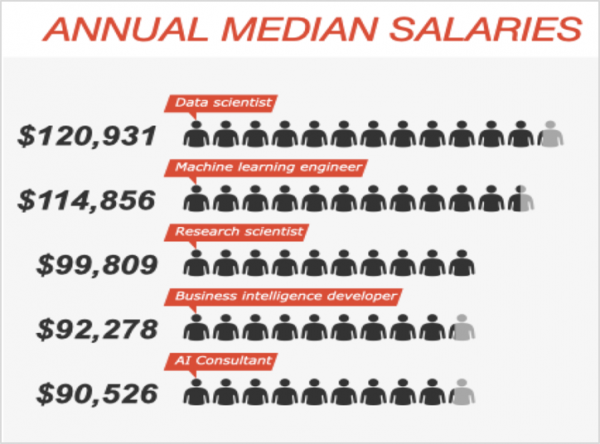Ivy Mar 20, 2019 No Comments
“AI is typically defined as the ability of a machine to perform cognitive functions we associate with
human minds, such as perceiving, reasoning, learning, interacting with the environment,
problem-solving, and even exercising creativity.” – Mc.Kinsey
Artificial Intelligence has taken the world by storm. Self-driving cars, Virtual reality, robots, smart homes, smart cities etc., -are no longer only a part of Hollywood movies. It is a reality today all thanks to machines getting smarter by the day.
But with that comes a downturn. According to Oxford University researchers, 47% of all current US employment is at high risk to become automated over the next decade or so.
Beacon of hope? A recent study from Gartner reports that of the 1.8 million jobs AI will get rid of, the emerging field will create 2.3 million new jobs by 2020. On similar lines a Capgemini has reported, 83% of companies using AI are already adding new jobs every day.
Top tech companies from Amazon to Microsoft, IBM, Accenture, Facebook, Intel, Uber to Wells Fargo have ramped up efforts to hire AI professionals in recent years.
First up – At least a bachelor’s degree in mathematics and basic computer technology. Higher-level positions require a Masters degree and often require a PhD
Note, a bachelor’s degrees only can get you a job at an entry-level position.
Opt for a course that typically offers you the following in order to be an AI specialist
– Knowledge of NLP
– Computer science (the solid foundation of popular programming languages like Python, R)
– A solid understanding of the logical, philosophical, and cognitive foundations of Artificial Intelligence research.
– Predictive Modeling building
– Automation with Advanced Excel
– A refresher in statistics (Regression, Hypothesis testing, probability) along with algebra, calculus, logic and algorithms
#Pro Tip: Already a software engineer? Take an AI-focused course to land a job in AI.
You can pursue a career in AI Research as a Research Scientist or AI Researcher armed with a Masters or a PhD in computer science. Target tech-giants having in house AI research facility e.g., Intel, Google or Apple. Employers look for candidates with knowledge and experience in computer perception, proficiency in training large scale models using modern machine learning packages, reinforcement learning, and natural language processing.
#Pro Tip: The Google AI Residency Program is a great idea to get started. It is a 12-month research training role where you get a chance to be mentored by distinguished scientists and engineers from various teams within Google AI, and work on real-world machine learning problems and applications.
Data Scientist
Individuals within the Data Scientist role is responsible for modelling complex data problems, unravelling
insights and identifying opportunities through the use of statistical, algorithmic, mining and visualization techniques and validating their findings using an experimental and iterative approach. In addition to advanced analytic skills, this role is also proficient at integrating and preparing large, varied datasets, architecting specialized database and computing environments, and communicating results. Data Scientists work closely with clients, data stewards, project/program managers, and other IT teams to turn data into critical information and knowledge that can be used to make sound organizational decisions.
Machine Learning Engineer
They are mostly responsible for building and managing scalable machine learning models that drive value across multiple areas of the business.
The role of a machine learning engineer is crucial to AI projects and is suitable for those with a background in applied research and data science. Machine learning engineers are expected to have a working knowledge of Machine Learning (of course!), AI and leverage deep learning when working with enormous datasets.

Business Intelligence Developer
Business intelligence (BI) developers primary analyzes complex data sets to identify business and market trends whilst playing a key role in improving the efficiency and profitability of a business.
Business intelligence developers are typically responsible for designing, building ETL processes to pull data from various data sources and also maintaining complex data in highly accessible cloud-based data platforms.
You can start off as a BI developer with a bachelor’s degree in engineering, computer science, or a related field. However, a combination of on-the-job experience and certifications is highly desired.
AI Consultant
As an AI consultant, you could either focus on developing custom AI solutions or help companies formulate their AI strategy.
They are responsible for analyzing and defining business use cases for AI, define value targets based on business drivers in consultation with the company clients on the AI Technology to use.
Companies look for experience with the development and/or integration of AI solutions solving business problems using leading AI vendor platforms is key, for example, Natural Language Processing (speech & text), Digital Assistants, Visual and Content Recognition, etc.
McKinsey’s acquisition of QuantumBlack and BCG setting up Gamma is viewed as a response to the emerging AI consulting activities.
Big Data Engineer/Architect
Big data engineers and architects play a vital role in developing an ecosystem that enables business systems to communicate with each other as they have the ability to design solutions independently based on high-level architecture.
Big data engineers and architects typically are tasked with planning, designing, and developing big data environments. They are entrusted with the responsibility of getting the Data Scientist’s machine learning models into production.
RS Components analyzed job posts from some of the world’s biggest tech companies to discover who has the highest percentage of AI-related job openings. Take a look at this interactive graphic here. I have included a salary compilation from Glassdoor for the various jobs in AI for your reference.

No sector or business is in any way immune from the impact of AI. If you cannot beat the robots, take up a career to make them work for you! Embrace “soft skills” like creativity, communication, problem-solving, and critical thinking that clearly differentiate humans from robots in the workplace. Take up an online or classroom training course in Machine Learning with Python or a Big Data certification with Ivy Pro School to gain the most relevant skills and prepare yourself for the future of work.
References:
Shromona Kahali – Content Strategist, Ivy Pro School
Leave a Reply